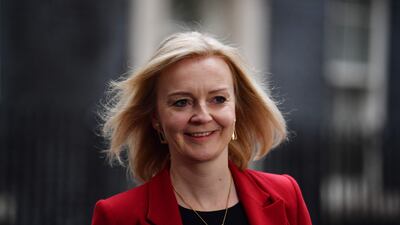British Foreign Secretary Liz Truss is to take over responsibility for the UK’s future relationship with the EU, Downing Street has said, after the resignation of Brexit minister Lord David Frost.
Mr Frost resigned with “immediate effect” on Saturday night, having earlier agreed with Prime Minister Boris Johnson that he would leave his job in January.
He said he was leaving because of “the current direction of travel” of the government, fears over “coercive” Covid measures and the wish for the UK to become a “lightly regulated, low-tax” economy.
Mr Frost’s departure was called a “watershed moment” in an extremely damaging week for Mr Johnson.
Downing Street said Ms Truss would take over ministerial responsibility for the UK-EU relationship, and would lead negotiations to resolve problems with the Northern Ireland Protocol.
She changed from being pro-Remain advocate to an avid Brexiteer after the referendum in 2016.
Ms Truss consistently polls as the most popular Cabinet minister with Tory members, and has been tipped as a future leadership contender.
Mr Frost on Monday defended his decision, saying he stepped down because he could not support the government’s “coercive policies on Covid”.
He said he and the prime minister had “never disagreed in any way" about Brexit policy.
“I left the government because, as I think is well-known, I couldn’t support certain policies, most recently on the Covid restrictions and Plan B,” he told Sky News.
“And if you’re a minister you have to support collective responsibility, you have to support decisions of the government and I couldn’t, so that’s why I had to leave.”
He insisted his decision was not because he disapproved of Mr Johnson’s leadership, saying the UK has a “great future” ahead of it under the prime minister “if we can get the policies right”.
Mr Frost said he had originally intended to leave the government in the new year but decided to bring forward the move in light of the government’s recent Plan B restrictions, which include vaccine passports for nightclubs. Unvaccinated patrons have to show a negative Covid test to gain entry to clubs.
Meanwhile, Chris Heaton-Harris will move from the Department for Transport to become Europe minister and will stand in for Ms Truss when needed.
Aldridge-Brownhills MP Wendy Morton will move from being Europe and Americas Minister to replace Mr Heaton-Harris at the transport department.
Mr Frost’s shock resignation piled more pressure on the prime minister.
Tobias Ellwood, Tory MP from Bournemouth East and chairman of the House of Commons defence select committee, said many Conservative colleagues shared Mr Frost’s desire for “a consistency of where we want to go”.
“I think this is what perhaps unites more and more of the wider party," Mr Ellwood told Times Radio.
"And we’ve seen this since the Owen Paterson debacle that it needs to be clarity of our vision, there needs to be a consistency of where we want to go, people need to be included, the decision-making in No 10 needs to be improved.
Mr Paterson held the seat of North Shropshire for the Conservatives for 24 years until he was found to have breached lobbying rules over two companies paying him and resigned.
“We need an, almost like a wartime leader, we need a strong No 10, and the machinery of No 10 around Boris Johnson, that’s what needs to be improved," Mr Ellwood said.
“The booster-ism, the energy, is not enough in these current circumstances alone.”
Peter Bone, MP for Wellingborough, echoed Mr Paterson's views.
“Boris has led this country exceptionally well but what comes next? And that’s what I think Lord Frost is talking about," he told Sky News.
“I think part of that rebellion of 100 Conservative MPs was partly due to the fact that we want to see the Prime Minister move to a more conservative agenda in future.”
Mr Bone also said he agreed with Mr Frost’s concerns over the prospect of “coercive measures” to control the coronavirus.
“I’ve cancelled all in-person meetings and the get-together with staff, I cancelled," he said.
“I won’t be going to crowded places but leave that up to the individual to make that decision, don’t have the state telling me what I have to do every day, and so in that regard, yes, I’m with Lord Frost on that.”
Meanwhile, chairman of the Northern Ireland affairs committee, Simon Hoare, said the issues flagged by Mr Frost were the same that had been raised by “at least one potential leadership candidate”.
“I do just wonder whether he’s acting as a bit of an outrider for them, I’m just not sure,” Mr Hoare told BBC Radio 4.
Health Secretary Sajid Javid defended the prime minister. “I think Boris Johnson is the best person to take us through the challenges the country faces,” he told Sky News.
He said he also understood why Mr Frost had resigned and called him a “principled” man.
Mr Ellwood said Mr Frost's resignation was an opportunity to “press the reset button with the EU”.
“We’re still not out of the woods with the Northern Ireland Protocol and we have some rather larger decisions and challenges, which actually unite both the EU, Europe and Britain,” he said.
“As much as I think this is going to be seen as a hit for the government – he was a critical character that’s been with Boris Johnson from the very start when it comes to Brexit – this is a chance for us actually to sort of move forward on our relationship with the EU."














